Critically Analyzing UK Constitution in Legal and Political Context
VerifiedAdded on 2020/12/26
|16
|5781
|310
Essay
AI Summary
This essay provides a detailed analysis of the UK constitution, focusing on the legal and political context surrounding the Miller v Secretary of State for Exiting the European Union case. It examines the arguments presented, including the role of prerogative powers, the supremacy of Parliament, and the impact of the European Communities Act 1972. The essay critiques the arguments from both legal and political perspectives, considering the implications of Brexit and the evolving nature of the UK constitution. The analysis also addresses the question of parliamentary sovereignty and the balance of power between the Crown, Parliament, and the people. The essay concludes with a reflection on the complexities of the UK constitution and its ongoing evolution, particularly in light of the referendum on EU membership and the subsequent legal challenges.
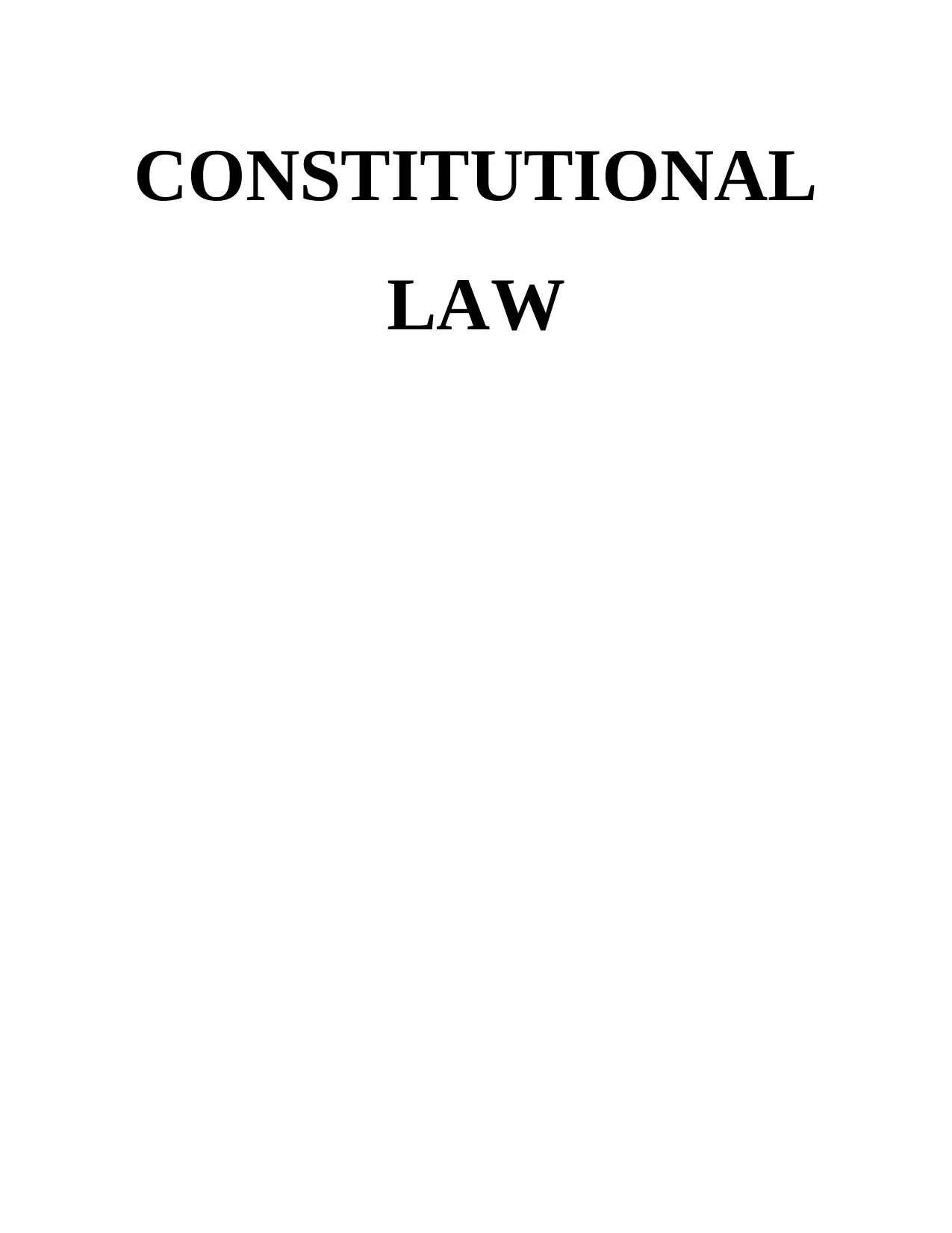
CONSTITUTIONAL
LAW
LAW
Paraphrase This Document
Need a fresh take? Get an instant paraphrase of this document with our AI Paraphraser
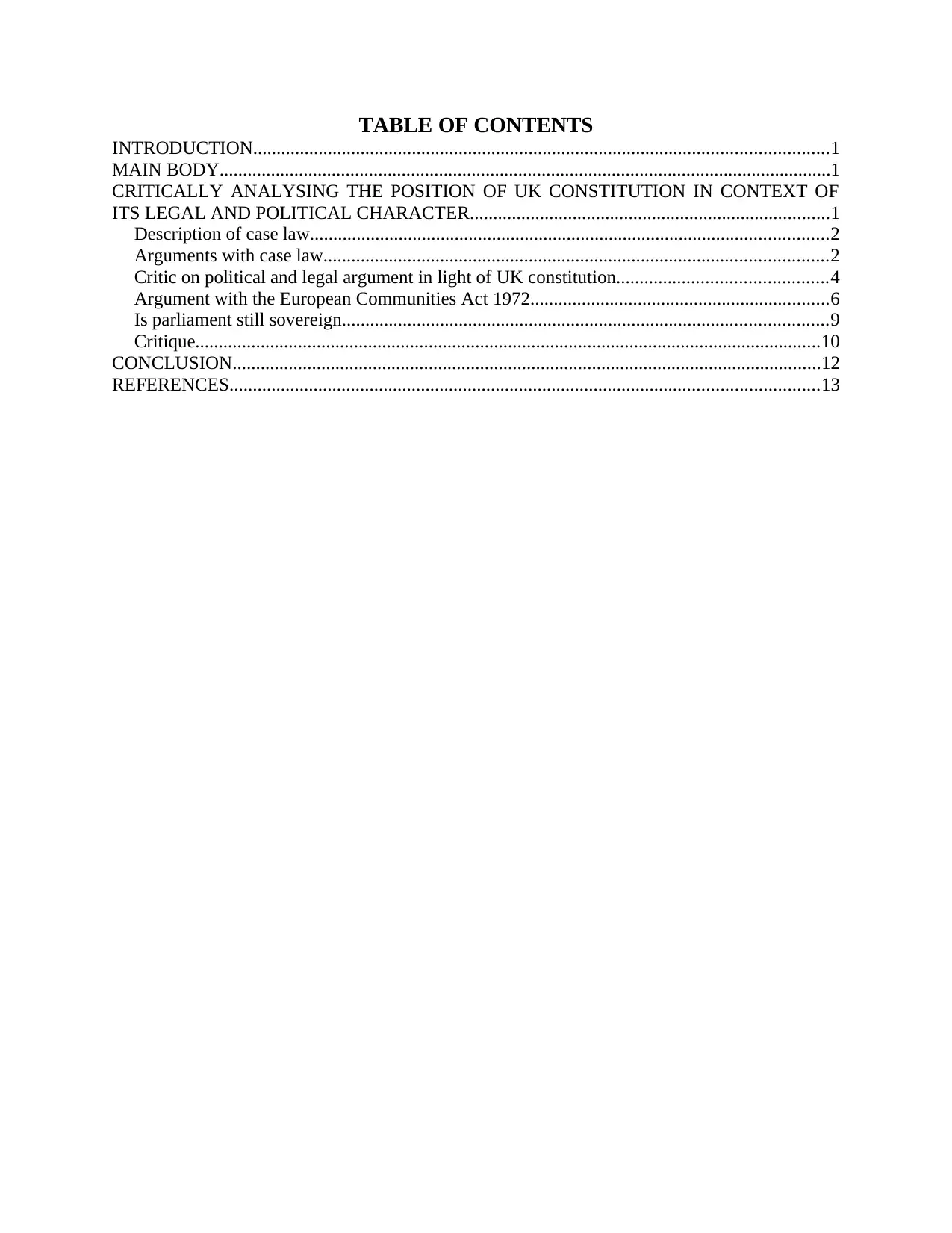
TABLE OF CONTENTS
INTRODUCTION...........................................................................................................................1
MAIN BODY...................................................................................................................................1
CRITICALLY ANALYSING THE POSITION OF UK CONSTITUTION IN CONTEXT OF
ITS LEGAL AND POLITICAL CHARACTER.............................................................................1
Description of case law...............................................................................................................2
Arguments with case law............................................................................................................2
Critic on political and legal argument in light of UK constitution.............................................4
Argument with the European Communities Act 1972................................................................6
Is parliament still sovereign........................................................................................................9
Critique......................................................................................................................................10
CONCLUSION..............................................................................................................................12
REFERENCES..............................................................................................................................13
INTRODUCTION...........................................................................................................................1
MAIN BODY...................................................................................................................................1
CRITICALLY ANALYSING THE POSITION OF UK CONSTITUTION IN CONTEXT OF
ITS LEGAL AND POLITICAL CHARACTER.............................................................................1
Description of case law...............................................................................................................2
Arguments with case law............................................................................................................2
Critic on political and legal argument in light of UK constitution.............................................4
Argument with the European Communities Act 1972................................................................6
Is parliament still sovereign........................................................................................................9
Critique......................................................................................................................................10
CONCLUSION..............................................................................................................................12
REFERENCES..............................................................................................................................13
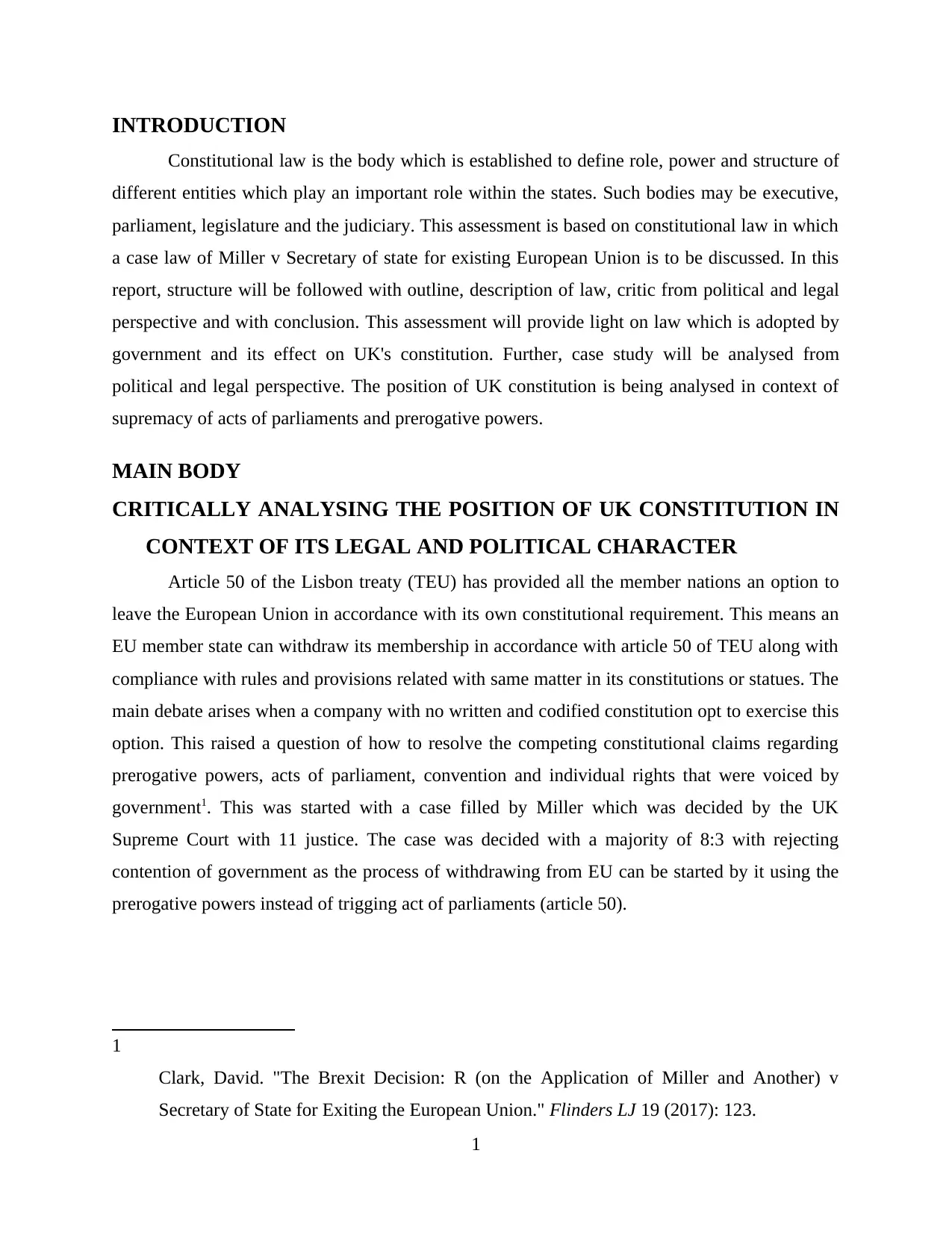
INTRODUCTION
Constitutional law is the body which is established to define role, power and structure of
different entities which play an important role within the states. Such bodies may be executive,
parliament, legislature and the judiciary. This assessment is based on constitutional law in which
a case law of Miller v Secretary of state for existing European Union is to be discussed. In this
report, structure will be followed with outline, description of law, critic from political and legal
perspective and with conclusion. This assessment will provide light on law which is adopted by
government and its effect on UK's constitution. Further, case study will be analysed from
political and legal perspective. The position of UK constitution is being analysed in context of
supremacy of acts of parliaments and prerogative powers.
MAIN BODY
CRITICALLY ANALYSING THE POSITION OF UK CONSTITUTION IN
CONTEXT OF ITS LEGAL AND POLITICAL CHARACTER
Article 50 of the Lisbon treaty (TEU) has provided all the member nations an option to
leave the European Union in accordance with its own constitutional requirement. This means an
EU member state can withdraw its membership in accordance with article 50 of TEU along with
compliance with rules and provisions related with same matter in its constitutions or statues. The
main debate arises when a company with no written and codified constitution opt to exercise this
option. This raised a question of how to resolve the competing constitutional claims regarding
prerogative powers, acts of parliament, convention and individual rights that were voiced by
government1. This was started with a case filled by Miller which was decided by the UK
Supreme Court with 11 justice. The case was decided with a majority of 8:3 with rejecting
contention of government as the process of withdrawing from EU can be started by it using the
prerogative powers instead of trigging act of parliaments (article 50).
1
Clark, David. "The Brexit Decision: R (on the Application of Miller and Another) v
Secretary of State for Exiting the European Union." Flinders LJ 19 (2017): 123.
1
Constitutional law is the body which is established to define role, power and structure of
different entities which play an important role within the states. Such bodies may be executive,
parliament, legislature and the judiciary. This assessment is based on constitutional law in which
a case law of Miller v Secretary of state for existing European Union is to be discussed. In this
report, structure will be followed with outline, description of law, critic from political and legal
perspective and with conclusion. This assessment will provide light on law which is adopted by
government and its effect on UK's constitution. Further, case study will be analysed from
political and legal perspective. The position of UK constitution is being analysed in context of
supremacy of acts of parliaments and prerogative powers.
MAIN BODY
CRITICALLY ANALYSING THE POSITION OF UK CONSTITUTION IN
CONTEXT OF ITS LEGAL AND POLITICAL CHARACTER
Article 50 of the Lisbon treaty (TEU) has provided all the member nations an option to
leave the European Union in accordance with its own constitutional requirement. This means an
EU member state can withdraw its membership in accordance with article 50 of TEU along with
compliance with rules and provisions related with same matter in its constitutions or statues. The
main debate arises when a company with no written and codified constitution opt to exercise this
option. This raised a question of how to resolve the competing constitutional claims regarding
prerogative powers, acts of parliament, convention and individual rights that were voiced by
government1. This was started with a case filled by Miller which was decided by the UK
Supreme Court with 11 justice. The case was decided with a majority of 8:3 with rejecting
contention of government as the process of withdrawing from EU can be started by it using the
prerogative powers instead of trigging act of parliaments (article 50).
1
Clark, David. "The Brexit Decision: R (on the Application of Miller and Another) v
Secretary of State for Exiting the European Union." Flinders LJ 19 (2017): 123.
1
⊘ This is a preview!⊘
Do you want full access?
Subscribe today to unlock all pages.

Trusted by 1+ million students worldwide
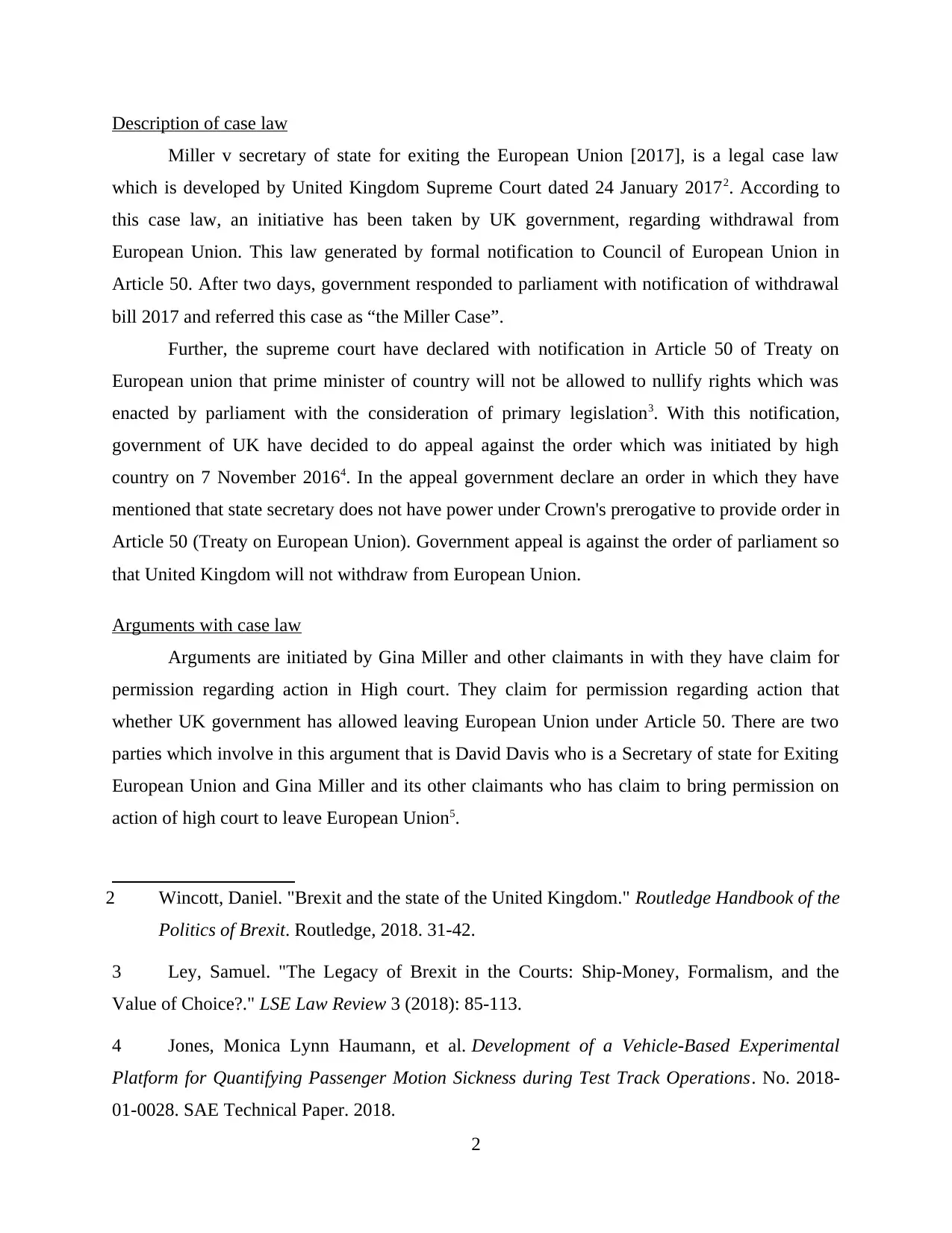
Description of case law
Miller v secretary of state for exiting the European Union [2017], is a legal case law
which is developed by United Kingdom Supreme Court dated 24 January 20172. According to
this case law, an initiative has been taken by UK government, regarding withdrawal from
European Union. This law generated by formal notification to Council of European Union in
Article 50. After two days, government responded to parliament with notification of withdrawal
bill 2017 and referred this case as “the Miller Case”.
Further, the supreme court have declared with notification in Article 50 of Treaty on
European union that prime minister of country will not be allowed to nullify rights which was
enacted by parliament with the consideration of primary legislation3. With this notification,
government of UK have decided to do appeal against the order which was initiated by high
country on 7 November 20164. In the appeal government declare an order in which they have
mentioned that state secretary does not have power under Crown's prerogative to provide order in
Article 50 (Treaty on European Union). Government appeal is against the order of parliament so
that United Kingdom will not withdraw from European Union.
Arguments with case law
Arguments are initiated by Gina Miller and other claimants in with they have claim for
permission regarding action in High court. They claim for permission regarding action that
whether UK government has allowed leaving European Union under Article 50. There are two
parties which involve in this argument that is David Davis who is a Secretary of state for Exiting
European Union and Gina Miller and its other claimants who has claim to bring permission on
action of high court to leave European Union5.
2 Wincott, Daniel. "Brexit and the state of the United Kingdom." Routledge Handbook of the
Politics of Brexit. Routledge, 2018. 31-42.
3 Ley, Samuel. "The Legacy of Brexit in the Courts: Ship-Money, Formalism, and the
Value of Choice?." LSE Law Review 3 (2018): 85-113.
4 Jones, Monica Lynn Haumann, et al. Development of a Vehicle-Based Experimental
Platform for Quantifying Passenger Motion Sickness during Test Track Operations. No. 2018-
01-0028. SAE Technical Paper. 2018.
2
Miller v secretary of state for exiting the European Union [2017], is a legal case law
which is developed by United Kingdom Supreme Court dated 24 January 20172. According to
this case law, an initiative has been taken by UK government, regarding withdrawal from
European Union. This law generated by formal notification to Council of European Union in
Article 50. After two days, government responded to parliament with notification of withdrawal
bill 2017 and referred this case as “the Miller Case”.
Further, the supreme court have declared with notification in Article 50 of Treaty on
European union that prime minister of country will not be allowed to nullify rights which was
enacted by parliament with the consideration of primary legislation3. With this notification,
government of UK have decided to do appeal against the order which was initiated by high
country on 7 November 20164. In the appeal government declare an order in which they have
mentioned that state secretary does not have power under Crown's prerogative to provide order in
Article 50 (Treaty on European Union). Government appeal is against the order of parliament so
that United Kingdom will not withdraw from European Union.
Arguments with case law
Arguments are initiated by Gina Miller and other claimants in with they have claim for
permission regarding action in High court. They claim for permission regarding action that
whether UK government has allowed leaving European Union under Article 50. There are two
parties which involve in this argument that is David Davis who is a Secretary of state for Exiting
European Union and Gina Miller and its other claimants who has claim to bring permission on
action of high court to leave European Union5.
2 Wincott, Daniel. "Brexit and the state of the United Kingdom." Routledge Handbook of the
Politics of Brexit. Routledge, 2018. 31-42.
3 Ley, Samuel. "The Legacy of Brexit in the Courts: Ship-Money, Formalism, and the
Value of Choice?." LSE Law Review 3 (2018): 85-113.
4 Jones, Monica Lynn Haumann, et al. Development of a Vehicle-Based Experimental
Platform for Quantifying Passenger Motion Sickness during Test Track Operations. No. 2018-
01-0028. SAE Technical Paper. 2018.
2
Paraphrase This Document
Need a fresh take? Get an instant paraphrase of this document with our AI Paraphraser
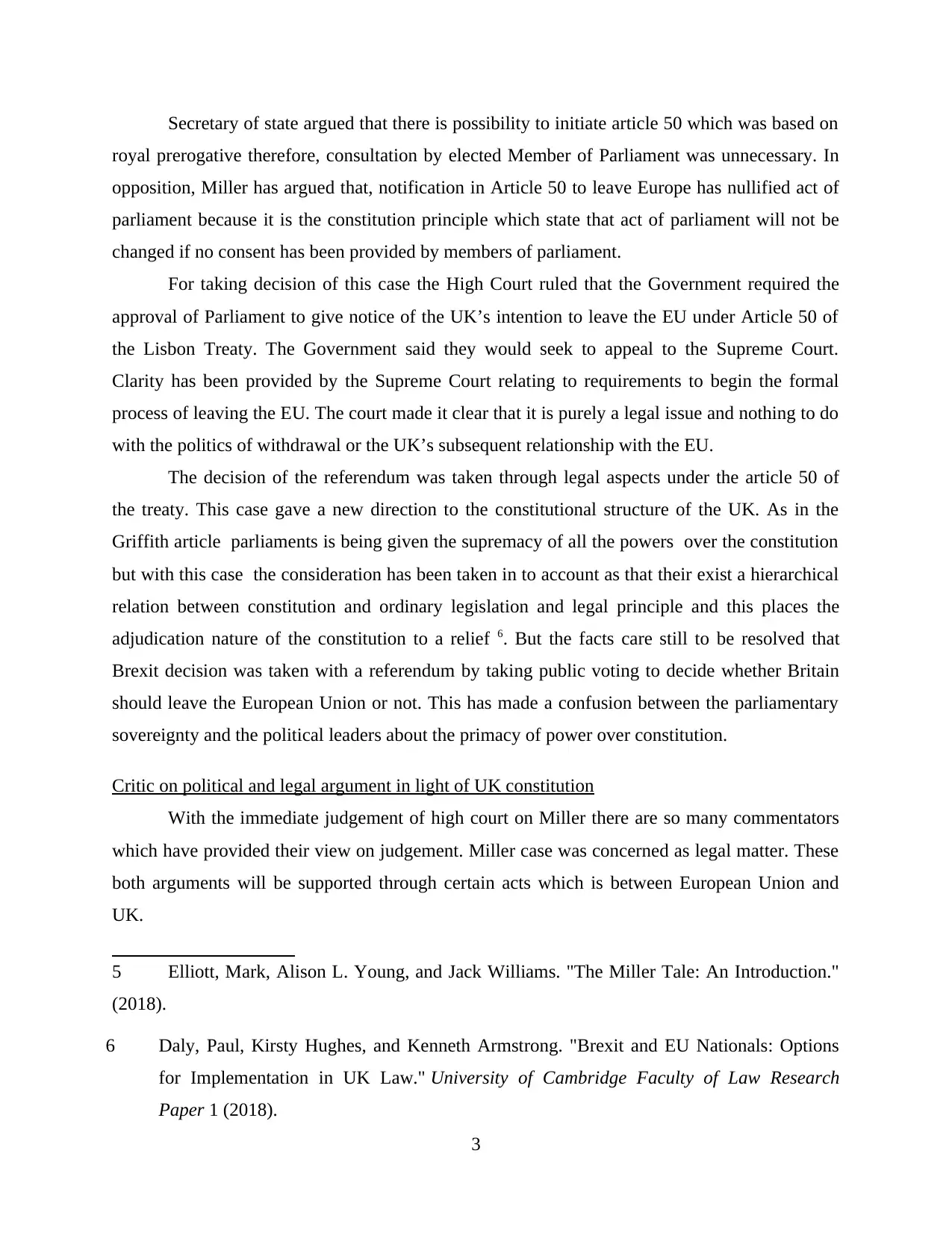
Secretary of state argued that there is possibility to initiate article 50 which was based on
royal prerogative therefore, consultation by elected Member of Parliament was unnecessary. In
opposition, Miller has argued that, notification in Article 50 to leave Europe has nullified act of
parliament because it is the constitution principle which state that act of parliament will not be
changed if no consent has been provided by members of parliament.
For taking decision of this case the High Court ruled that the Government required the
approval of Parliament to give notice of the UK’s intention to leave the EU under Article 50 of
the Lisbon Treaty. The Government said they would seek to appeal to the Supreme Court.
Clarity has been provided by the Supreme Court relating to requirements to begin the formal
process of leaving the EU. The court made it clear that it is purely a legal issue and nothing to do
with the politics of withdrawal or the UK’s subsequent relationship with the EU.
The decision of the referendum was taken through legal aspects under the article 50 of
the treaty. This case gave a new direction to the constitutional structure of the UK. As in the
Griffith article parliaments is being given the supremacy of all the powers over the constitution
but with this case the consideration has been taken in to account as that their exist a hierarchical
relation between constitution and ordinary legislation and legal principle and this places the
adjudication nature of the constitution to a relief 6. But the facts care still to be resolved that
Brexit decision was taken with a referendum by taking public voting to decide whether Britain
should leave the European Union or not. This has made a confusion between the parliamentary
sovereignty and the political leaders about the primacy of power over constitution.
Critic on political and legal argument in light of UK constitution
With the immediate judgement of high court on Miller there are so many commentators
which have provided their view on judgement. Miller case was concerned as legal matter. These
both arguments will be supported through certain acts which is between European Union and
UK.
5 Elliott, Mark, Alison L. Young, and Jack Williams. "The Miller Tale: An Introduction."
(2018).
6 Daly, Paul, Kirsty Hughes, and Kenneth Armstrong. "Brexit and EU Nationals: Options
for Implementation in UK Law." University of Cambridge Faculty of Law Research
Paper 1 (2018).
3
royal prerogative therefore, consultation by elected Member of Parliament was unnecessary. In
opposition, Miller has argued that, notification in Article 50 to leave Europe has nullified act of
parliament because it is the constitution principle which state that act of parliament will not be
changed if no consent has been provided by members of parliament.
For taking decision of this case the High Court ruled that the Government required the
approval of Parliament to give notice of the UK’s intention to leave the EU under Article 50 of
the Lisbon Treaty. The Government said they would seek to appeal to the Supreme Court.
Clarity has been provided by the Supreme Court relating to requirements to begin the formal
process of leaving the EU. The court made it clear that it is purely a legal issue and nothing to do
with the politics of withdrawal or the UK’s subsequent relationship with the EU.
The decision of the referendum was taken through legal aspects under the article 50 of
the treaty. This case gave a new direction to the constitutional structure of the UK. As in the
Griffith article parliaments is being given the supremacy of all the powers over the constitution
but with this case the consideration has been taken in to account as that their exist a hierarchical
relation between constitution and ordinary legislation and legal principle and this places the
adjudication nature of the constitution to a relief 6. But the facts care still to be resolved that
Brexit decision was taken with a referendum by taking public voting to decide whether Britain
should leave the European Union or not. This has made a confusion between the parliamentary
sovereignty and the political leaders about the primacy of power over constitution.
Critic on political and legal argument in light of UK constitution
With the immediate judgement of high court on Miller there are so many commentators
which have provided their view on judgement. Miller case was concerned as legal matter. These
both arguments will be supported through certain acts which is between European Union and
UK.
5 Elliott, Mark, Alison L. Young, and Jack Williams. "The Miller Tale: An Introduction."
(2018).
6 Daly, Paul, Kirsty Hughes, and Kenneth Armstrong. "Brexit and EU Nationals: Options
for Implementation in UK Law." University of Cambridge Faculty of Law Research
Paper 1 (2018).
3
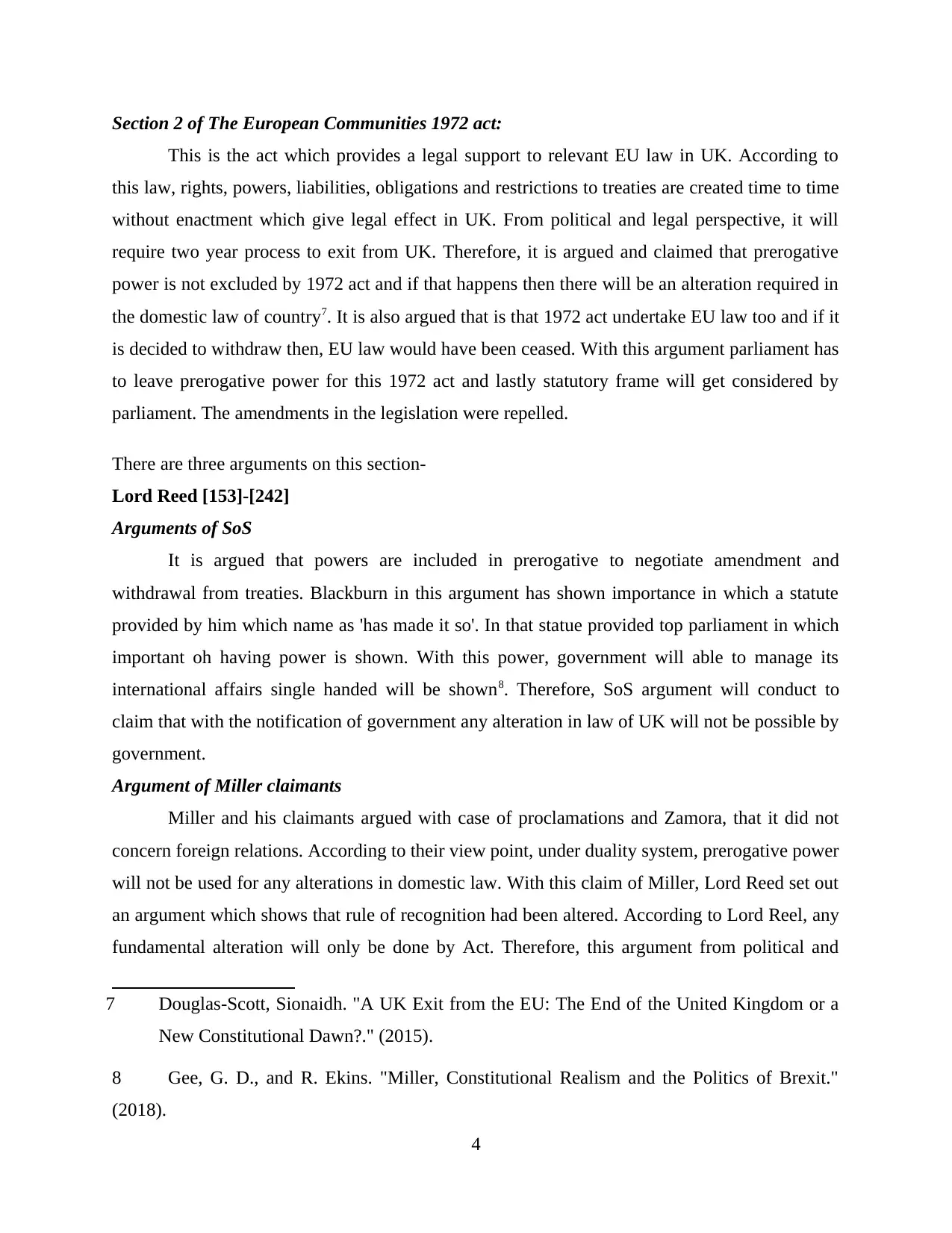
Section 2 of The European Communities 1972 act:
This is the act which provides a legal support to relevant EU law in UK. According to
this law, rights, powers, liabilities, obligations and restrictions to treaties are created time to time
without enactment which give legal effect in UK. From political and legal perspective, it will
require two year process to exit from UK. Therefore, it is argued and claimed that prerogative
power is not excluded by 1972 act and if that happens then there will be an alteration required in
the domestic law of country7. It is also argued that is that 1972 act undertake EU law too and if it
is decided to withdraw then, EU law would have been ceased. With this argument parliament has
to leave prerogative power for this 1972 act and lastly statutory frame will get considered by
parliament. The amendments in the legislation were repelled.
There are three arguments on this section-
Lord Reed [153]-[242]
Arguments of SoS
It is argued that powers are included in prerogative to negotiate amendment and
withdrawal from treaties. Blackburn in this argument has shown importance in which a statute
provided by him which name as 'has made it so'. In that statue provided top parliament in which
important oh having power is shown. With this power, government will able to manage its
international affairs single handed will be shown8. Therefore, SoS argument will conduct to
claim that with the notification of government any alteration in law of UK will not be possible by
government.
Argument of Miller claimants
Miller and his claimants argued with case of proclamations and Zamora, that it did not
concern foreign relations. According to their view point, under duality system, prerogative power
will not be used for any alterations in domestic law. With this claim of Miller, Lord Reed set out
an argument which shows that rule of recognition had been altered. According to Lord Reel, any
fundamental alteration will only be done by Act. Therefore, this argument from political and
7 Douglas-Scott, Sionaidh. "A UK Exit from the EU: The End of the United Kingdom or a
New Constitutional Dawn?." (2015).
8 Gee, G. D., and R. Ekins. "Miller, Constitutional Realism and the Politics of Brexit."
(2018).
4
This is the act which provides a legal support to relevant EU law in UK. According to
this law, rights, powers, liabilities, obligations and restrictions to treaties are created time to time
without enactment which give legal effect in UK. From political and legal perspective, it will
require two year process to exit from UK. Therefore, it is argued and claimed that prerogative
power is not excluded by 1972 act and if that happens then there will be an alteration required in
the domestic law of country7. It is also argued that is that 1972 act undertake EU law too and if it
is decided to withdraw then, EU law would have been ceased. With this argument parliament has
to leave prerogative power for this 1972 act and lastly statutory frame will get considered by
parliament. The amendments in the legislation were repelled.
There are three arguments on this section-
Lord Reed [153]-[242]
Arguments of SoS
It is argued that powers are included in prerogative to negotiate amendment and
withdrawal from treaties. Blackburn in this argument has shown importance in which a statute
provided by him which name as 'has made it so'. In that statue provided top parliament in which
important oh having power is shown. With this power, government will able to manage its
international affairs single handed will be shown8. Therefore, SoS argument will conduct to
claim that with the notification of government any alteration in law of UK will not be possible by
government.
Argument of Miller claimants
Miller and his claimants argued with case of proclamations and Zamora, that it did not
concern foreign relations. According to their view point, under duality system, prerogative power
will not be used for any alterations in domestic law. With this claim of Miller, Lord Reed set out
an argument which shows that rule of recognition had been altered. According to Lord Reel, any
fundamental alteration will only be done by Act. Therefore, this argument from political and
7 Douglas-Scott, Sionaidh. "A UK Exit from the EU: The End of the United Kingdom or a
New Constitutional Dawn?." (2015).
8 Gee, G. D., and R. Ekins. "Miller, Constitutional Realism and the Politics of Brexit."
(2018).
4
⊘ This is a preview!⊘
Do you want full access?
Subscribe today to unlock all pages.

Trusted by 1+ million students worldwide
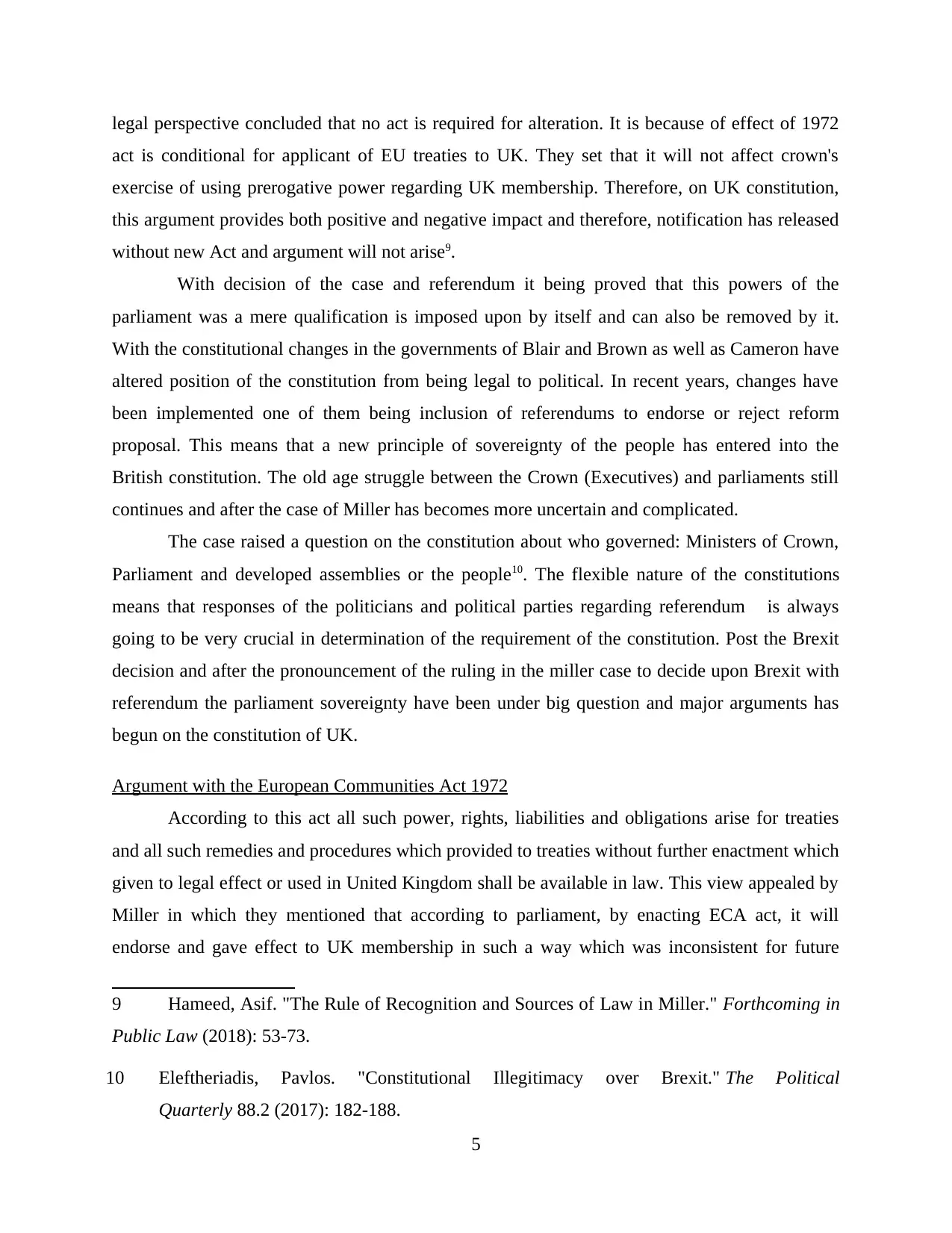
legal perspective concluded that no act is required for alteration. It is because of effect of 1972
act is conditional for applicant of EU treaties to UK. They set that it will not affect crown's
exercise of using prerogative power regarding UK membership. Therefore, on UK constitution,
this argument provides both positive and negative impact and therefore, notification has released
without new Act and argument will not arise9.
With decision of the case and referendum it being proved that this powers of the
parliament was a mere qualification is imposed upon by itself and can also be removed by it.
With the constitutional changes in the governments of Blair and Brown as well as Cameron have
altered position of the constitution from being legal to political. In recent years, changes have
been implemented one of them being inclusion of referendums to endorse or reject reform
proposal. This means that a new principle of sovereignty of the people has entered into the
British constitution. The old age struggle between the Crown (Executives) and parliaments still
continues and after the case of Miller has becomes more uncertain and complicated.
The case raised a question on the constitution about who governed: Ministers of Crown,
Parliament and developed assemblies or the people10. The flexible nature of the constitutions
means that responses of the politicians and political parties regarding referendum is always
going to be very crucial in determination of the requirement of the constitution. Post the Brexit
decision and after the pronouncement of the ruling in the miller case to decide upon Brexit with
referendum the parliament sovereignty have been under big question and major arguments has
begun on the constitution of UK.
Argument with the European Communities Act 1972
According to this act all such power, rights, liabilities and obligations arise for treaties
and all such remedies and procedures which provided to treaties without further enactment which
given to legal effect or used in United Kingdom shall be available in law. This view appealed by
Miller in which they mentioned that according to parliament, by enacting ECA act, it will
endorse and gave effect to UK membership in such a way which was inconsistent for future
9 Hameed, Asif. "The Rule of Recognition and Sources of Law in Miller." Forthcoming in
Public Law (2018): 53-73.
10 Eleftheriadis, Pavlos. "Constitutional Illegitimacy over Brexit." The Political
Quarterly 88.2 (2017): 182-188.
5
act is conditional for applicant of EU treaties to UK. They set that it will not affect crown's
exercise of using prerogative power regarding UK membership. Therefore, on UK constitution,
this argument provides both positive and negative impact and therefore, notification has released
without new Act and argument will not arise9.
With decision of the case and referendum it being proved that this powers of the
parliament was a mere qualification is imposed upon by itself and can also be removed by it.
With the constitutional changes in the governments of Blair and Brown as well as Cameron have
altered position of the constitution from being legal to political. In recent years, changes have
been implemented one of them being inclusion of referendums to endorse or reject reform
proposal. This means that a new principle of sovereignty of the people has entered into the
British constitution. The old age struggle between the Crown (Executives) and parliaments still
continues and after the case of Miller has becomes more uncertain and complicated.
The case raised a question on the constitution about who governed: Ministers of Crown,
Parliament and developed assemblies or the people10. The flexible nature of the constitutions
means that responses of the politicians and political parties regarding referendum is always
going to be very crucial in determination of the requirement of the constitution. Post the Brexit
decision and after the pronouncement of the ruling in the miller case to decide upon Brexit with
referendum the parliament sovereignty have been under big question and major arguments has
begun on the constitution of UK.
Argument with the European Communities Act 1972
According to this act all such power, rights, liabilities and obligations arise for treaties
and all such remedies and procedures which provided to treaties without further enactment which
given to legal effect or used in United Kingdom shall be available in law. This view appealed by
Miller in which they mentioned that according to parliament, by enacting ECA act, it will
endorse and gave effect to UK membership in such a way which was inconsistent for future
9 Hameed, Asif. "The Rule of Recognition and Sources of Law in Miller." Forthcoming in
Public Law (2018): 53-73.
10 Eleftheriadis, Pavlos. "Constitutional Illegitimacy over Brexit." The Political
Quarterly 88.2 (2017): 182-188.
5
Paraphrase This Document
Need a fresh take? Get an instant paraphrase of this document with our AI Paraphraser
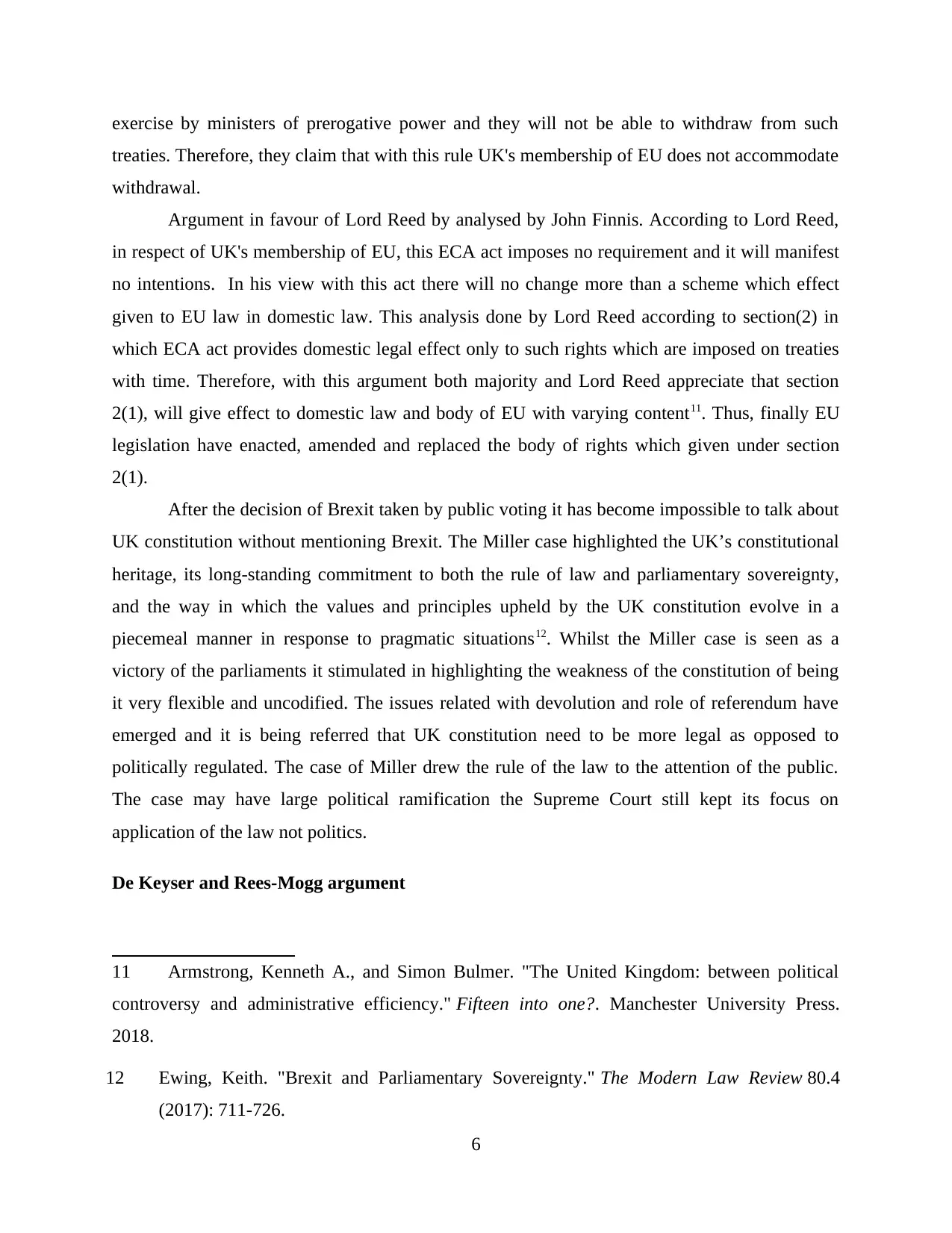
exercise by ministers of prerogative power and they will not be able to withdraw from such
treaties. Therefore, they claim that with this rule UK's membership of EU does not accommodate
withdrawal.
Argument in favour of Lord Reed by analysed by John Finnis. According to Lord Reed,
in respect of UK's membership of EU, this ECA act imposes no requirement and it will manifest
no intentions. In his view with this act there will no change more than a scheme which effect
given to EU law in domestic law. This analysis done by Lord Reed according to section(2) in
which ECA act provides domestic legal effect only to such rights which are imposed on treaties
with time. Therefore, with this argument both majority and Lord Reed appreciate that section
2(1), will give effect to domestic law and body of EU with varying content11. Thus, finally EU
legislation have enacted, amended and replaced the body of rights which given under section
2(1).
After the decision of Brexit taken by public voting it has become impossible to talk about
UK constitution without mentioning Brexit. The Miller case highlighted the UK’s constitutional
heritage, its long-standing commitment to both the rule of law and parliamentary sovereignty,
and the way in which the values and principles upheld by the UK constitution evolve in a
piecemeal manner in response to pragmatic situations12. Whilst the Miller case is seen as a
victory of the parliaments it stimulated in highlighting the weakness of the constitution of being
it very flexible and uncodified. The issues related with devolution and role of referendum have
emerged and it is being referred that UK constitution need to be more legal as opposed to
politically regulated. The case of Miller drew the rule of the law to the attention of the public.
The case may have large political ramification the Supreme Court still kept its focus on
application of the law not politics.
De Keyser and Rees-Mogg argument
11 Armstrong, Kenneth A., and Simon Bulmer. "The United Kingdom: between political
controversy and administrative efficiency." Fifteen into one?. Manchester University Press.
2018.
12 Ewing, Keith. "Brexit and Parliamentary Sovereignty." The Modern Law Review 80.4
(2017): 711-726.
6
treaties. Therefore, they claim that with this rule UK's membership of EU does not accommodate
withdrawal.
Argument in favour of Lord Reed by analysed by John Finnis. According to Lord Reed,
in respect of UK's membership of EU, this ECA act imposes no requirement and it will manifest
no intentions. In his view with this act there will no change more than a scheme which effect
given to EU law in domestic law. This analysis done by Lord Reed according to section(2) in
which ECA act provides domestic legal effect only to such rights which are imposed on treaties
with time. Therefore, with this argument both majority and Lord Reed appreciate that section
2(1), will give effect to domestic law and body of EU with varying content11. Thus, finally EU
legislation have enacted, amended and replaced the body of rights which given under section
2(1).
After the decision of Brexit taken by public voting it has become impossible to talk about
UK constitution without mentioning Brexit. The Miller case highlighted the UK’s constitutional
heritage, its long-standing commitment to both the rule of law and parliamentary sovereignty,
and the way in which the values and principles upheld by the UK constitution evolve in a
piecemeal manner in response to pragmatic situations12. Whilst the Miller case is seen as a
victory of the parliaments it stimulated in highlighting the weakness of the constitution of being
it very flexible and uncodified. The issues related with devolution and role of referendum have
emerged and it is being referred that UK constitution need to be more legal as opposed to
politically regulated. The case of Miller drew the rule of the law to the attention of the public.
The case may have large political ramification the Supreme Court still kept its focus on
application of the law not politics.
De Keyser and Rees-Mogg argument
11 Armstrong, Kenneth A., and Simon Bulmer. "The United Kingdom: between political
controversy and administrative efficiency." Fifteen into one?. Manchester University Press.
2018.
12 Ewing, Keith. "Brexit and Parliamentary Sovereignty." The Modern Law Review 80.4
(2017): 711-726.
6
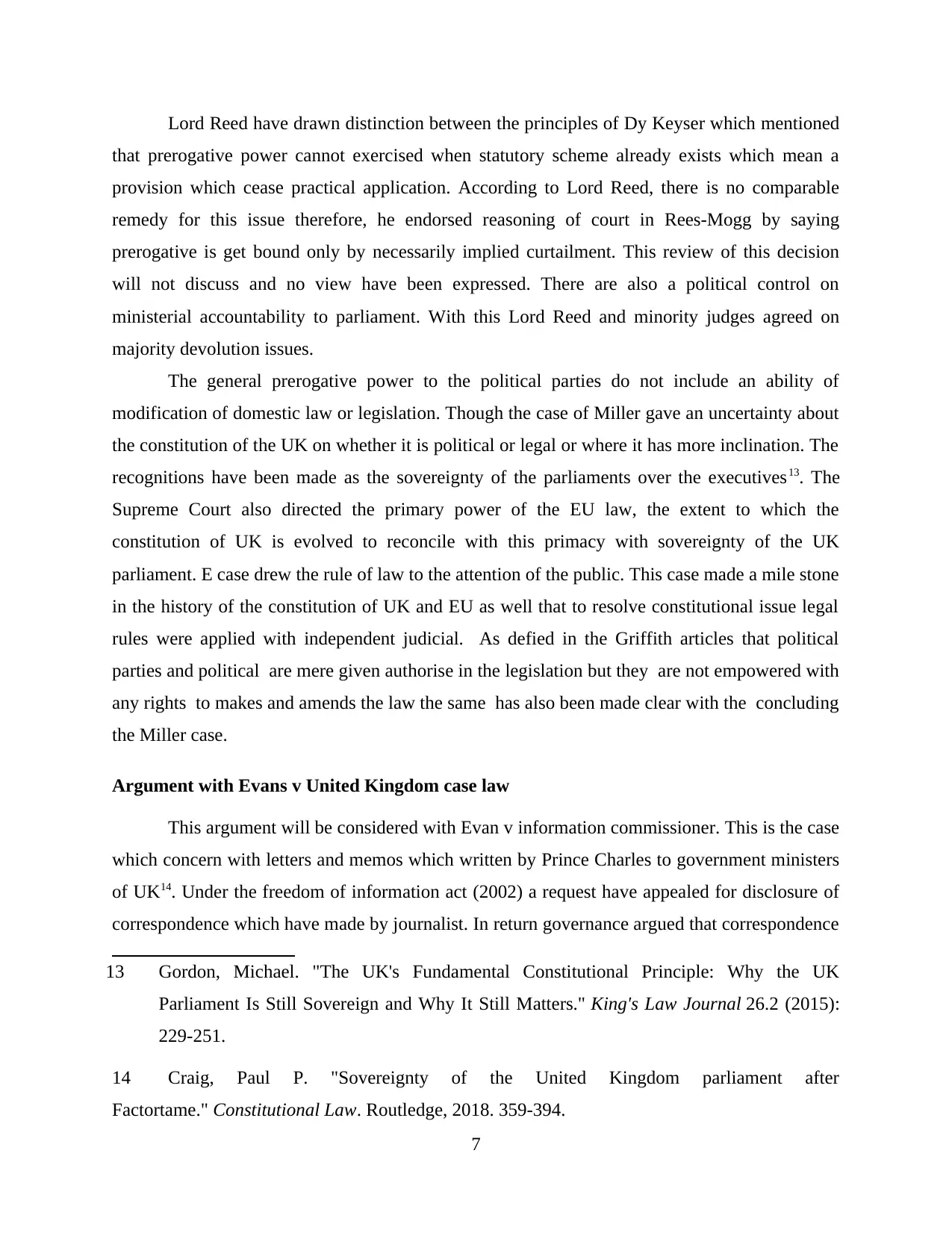
Lord Reed have drawn distinction between the principles of Dy Keyser which mentioned
that prerogative power cannot exercised when statutory scheme already exists which mean a
provision which cease practical application. According to Lord Reed, there is no comparable
remedy for this issue therefore, he endorsed reasoning of court in Rees-Mogg by saying
prerogative is get bound only by necessarily implied curtailment. This review of this decision
will not discuss and no view have been expressed. There are also a political control on
ministerial accountability to parliament. With this Lord Reed and minority judges agreed on
majority devolution issues.
The general prerogative power to the political parties do not include an ability of
modification of domestic law or legislation. Though the case of Miller gave an uncertainty about
the constitution of the UK on whether it is political or legal or where it has more inclination. The
recognitions have been made as the sovereignty of the parliaments over the executives13. The
Supreme Court also directed the primary power of the EU law, the extent to which the
constitution of UK is evolved to reconcile with this primacy with sovereignty of the UK
parliament. E case drew the rule of law to the attention of the public. This case made a mile stone
in the history of the constitution of UK and EU as well that to resolve constitutional issue legal
rules were applied with independent judicial. As defied in the Griffith articles that political
parties and political are mere given authorise in the legislation but they are not empowered with
any rights to makes and amends the law the same has also been made clear with the concluding
the Miller case.
Argument with Evans v United Kingdom case law
This argument will be considered with Evan v information commissioner. This is the case
which concern with letters and memos which written by Prince Charles to government ministers
of UK14. Under the freedom of information act (2002) a request have appealed for disclosure of
correspondence which have made by journalist. In return governance argued that correspondence
13 Gordon, Michael. "The UK's Fundamental Constitutional Principle: Why the UK
Parliament Is Still Sovereign and Why It Still Matters." King's Law Journal 26.2 (2015):
229-251.
14 Craig, Paul P. "Sovereignty of the United Kingdom parliament after
Factortame." Constitutional Law. Routledge, 2018. 359-394.
7
that prerogative power cannot exercised when statutory scheme already exists which mean a
provision which cease practical application. According to Lord Reed, there is no comparable
remedy for this issue therefore, he endorsed reasoning of court in Rees-Mogg by saying
prerogative is get bound only by necessarily implied curtailment. This review of this decision
will not discuss and no view have been expressed. There are also a political control on
ministerial accountability to parliament. With this Lord Reed and minority judges agreed on
majority devolution issues.
The general prerogative power to the political parties do not include an ability of
modification of domestic law or legislation. Though the case of Miller gave an uncertainty about
the constitution of the UK on whether it is political or legal or where it has more inclination. The
recognitions have been made as the sovereignty of the parliaments over the executives13. The
Supreme Court also directed the primary power of the EU law, the extent to which the
constitution of UK is evolved to reconcile with this primacy with sovereignty of the UK
parliament. E case drew the rule of law to the attention of the public. This case made a mile stone
in the history of the constitution of UK and EU as well that to resolve constitutional issue legal
rules were applied with independent judicial. As defied in the Griffith articles that political
parties and political are mere given authorise in the legislation but they are not empowered with
any rights to makes and amends the law the same has also been made clear with the concluding
the Miller case.
Argument with Evans v United Kingdom case law
This argument will be considered with Evan v information commissioner. This is the case
which concern with letters and memos which written by Prince Charles to government ministers
of UK14. Under the freedom of information act (2002) a request have appealed for disclosure of
correspondence which have made by journalist. In return governance argued that correspondence
13 Gordon, Michael. "The UK's Fundamental Constitutional Principle: Why the UK
Parliament Is Still Sovereign and Why It Still Matters." King's Law Journal 26.2 (2015):
229-251.
14 Craig, Paul P. "Sovereignty of the United Kingdom parliament after
Factortame." Constitutional Law. Routledge, 2018. 359-394.
7
⊘ This is a preview!⊘
Do you want full access?
Subscribe today to unlock all pages.

Trusted by 1+ million students worldwide
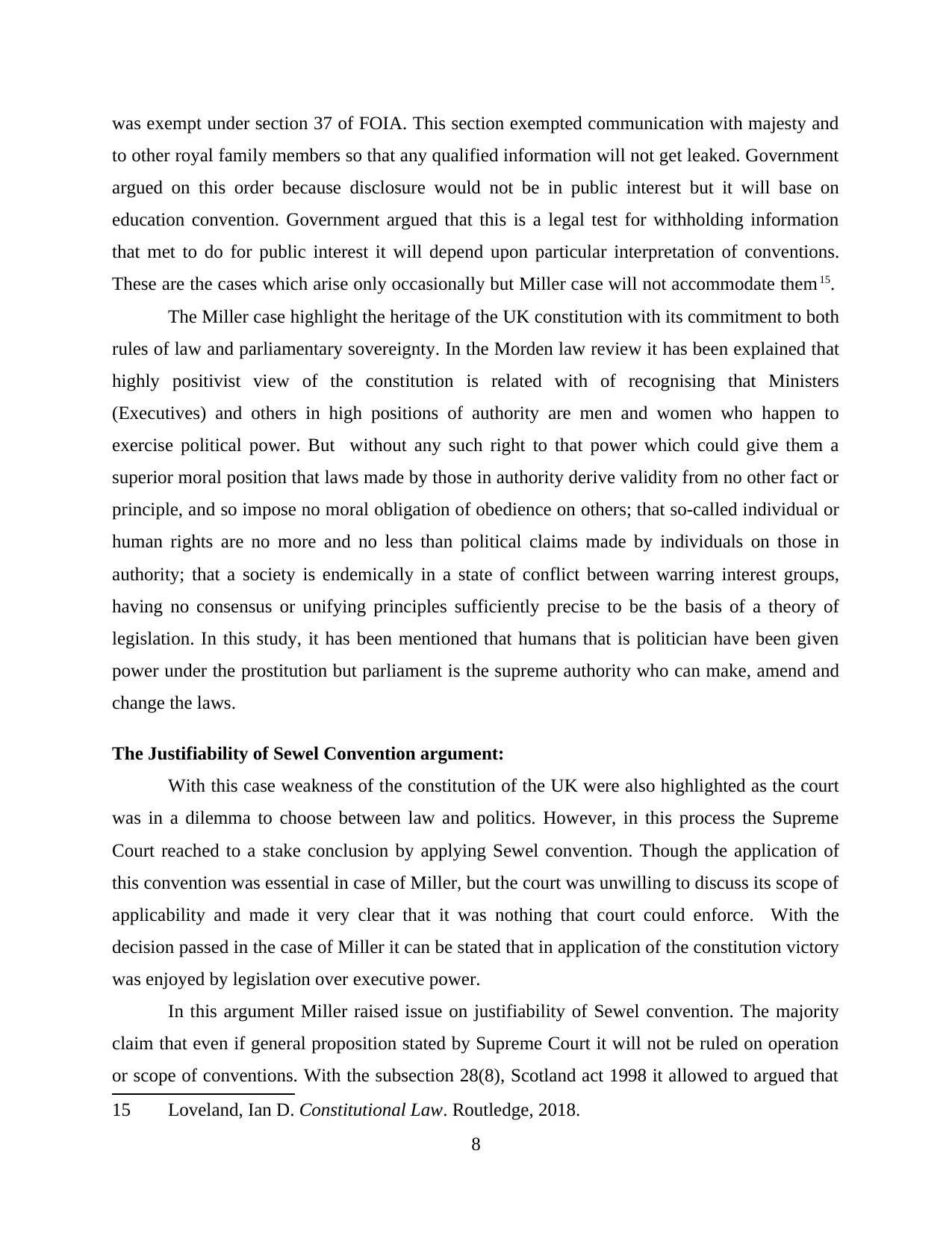
was exempt under section 37 of FOIA. This section exempted communication with majesty and
to other royal family members so that any qualified information will not get leaked. Government
argued on this order because disclosure would not be in public interest but it will base on
education convention. Government argued that this is a legal test for withholding information
that met to do for public interest it will depend upon particular interpretation of conventions.
These are the cases which arise only occasionally but Miller case will not accommodate them15.
The Miller case highlight the heritage of the UK constitution with its commitment to both
rules of law and parliamentary sovereignty. In the Morden law review it has been explained that
highly positivist view of the constitution is related with of recognising that Ministers
(Executives) and others in high positions of authority are men and women who happen to
exercise political power. But without any such right to that power which could give them a
superior moral position that laws made by those in authority derive validity from no other fact or
principle, and so impose no moral obligation of obedience on others; that so-called individual or
human rights are no more and no less than political claims made by individuals on those in
authority; that a society is endemically in a state of conflict between warring interest groups,
having no consensus or unifying principles sufficiently precise to be the basis of a theory of
legislation. In this study, it has been mentioned that humans that is politician have been given
power under the prostitution but parliament is the supreme authority who can make, amend and
change the laws.
The Justifiability of Sewel Convention argument:
With this case weakness of the constitution of the UK were also highlighted as the court
was in a dilemma to choose between law and politics. However, in this process the Supreme
Court reached to a stake conclusion by applying Sewel convention. Though the application of
this convention was essential in case of Miller, but the court was unwilling to discuss its scope of
applicability and made it very clear that it was nothing that court could enforce. With the
decision passed in the case of Miller it can be stated that in application of the constitution victory
was enjoyed by legislation over executive power.
In this argument Miller raised issue on justifiability of Sewel convention. The majority
claim that even if general proposition stated by Supreme Court it will not be ruled on operation
or scope of conventions. With the subsection 28(8), Scotland act 1998 it allowed to argued that
15 Loveland, Ian D. Constitutional Law. Routledge, 2018.
8
to other royal family members so that any qualified information will not get leaked. Government
argued on this order because disclosure would not be in public interest but it will base on
education convention. Government argued that this is a legal test for withholding information
that met to do for public interest it will depend upon particular interpretation of conventions.
These are the cases which arise only occasionally but Miller case will not accommodate them15.
The Miller case highlight the heritage of the UK constitution with its commitment to both
rules of law and parliamentary sovereignty. In the Morden law review it has been explained that
highly positivist view of the constitution is related with of recognising that Ministers
(Executives) and others in high positions of authority are men and women who happen to
exercise political power. But without any such right to that power which could give them a
superior moral position that laws made by those in authority derive validity from no other fact or
principle, and so impose no moral obligation of obedience on others; that so-called individual or
human rights are no more and no less than political claims made by individuals on those in
authority; that a society is endemically in a state of conflict between warring interest groups,
having no consensus or unifying principles sufficiently precise to be the basis of a theory of
legislation. In this study, it has been mentioned that humans that is politician have been given
power under the prostitution but parliament is the supreme authority who can make, amend and
change the laws.
The Justifiability of Sewel Convention argument:
With this case weakness of the constitution of the UK were also highlighted as the court
was in a dilemma to choose between law and politics. However, in this process the Supreme
Court reached to a stake conclusion by applying Sewel convention. Though the application of
this convention was essential in case of Miller, but the court was unwilling to discuss its scope of
applicability and made it very clear that it was nothing that court could enforce. With the
decision passed in the case of Miller it can be stated that in application of the constitution victory
was enjoyed by legislation over executive power.
In this argument Miller raised issue on justifiability of Sewel convention. The majority
claim that even if general proposition stated by Supreme Court it will not be ruled on operation
or scope of conventions. With the subsection 28(8), Scotland act 1998 it allowed to argued that
15 Loveland, Ian D. Constitutional Law. Routledge, 2018.
8
Paraphrase This Document
Need a fresh take? Get an instant paraphrase of this document with our AI Paraphraser
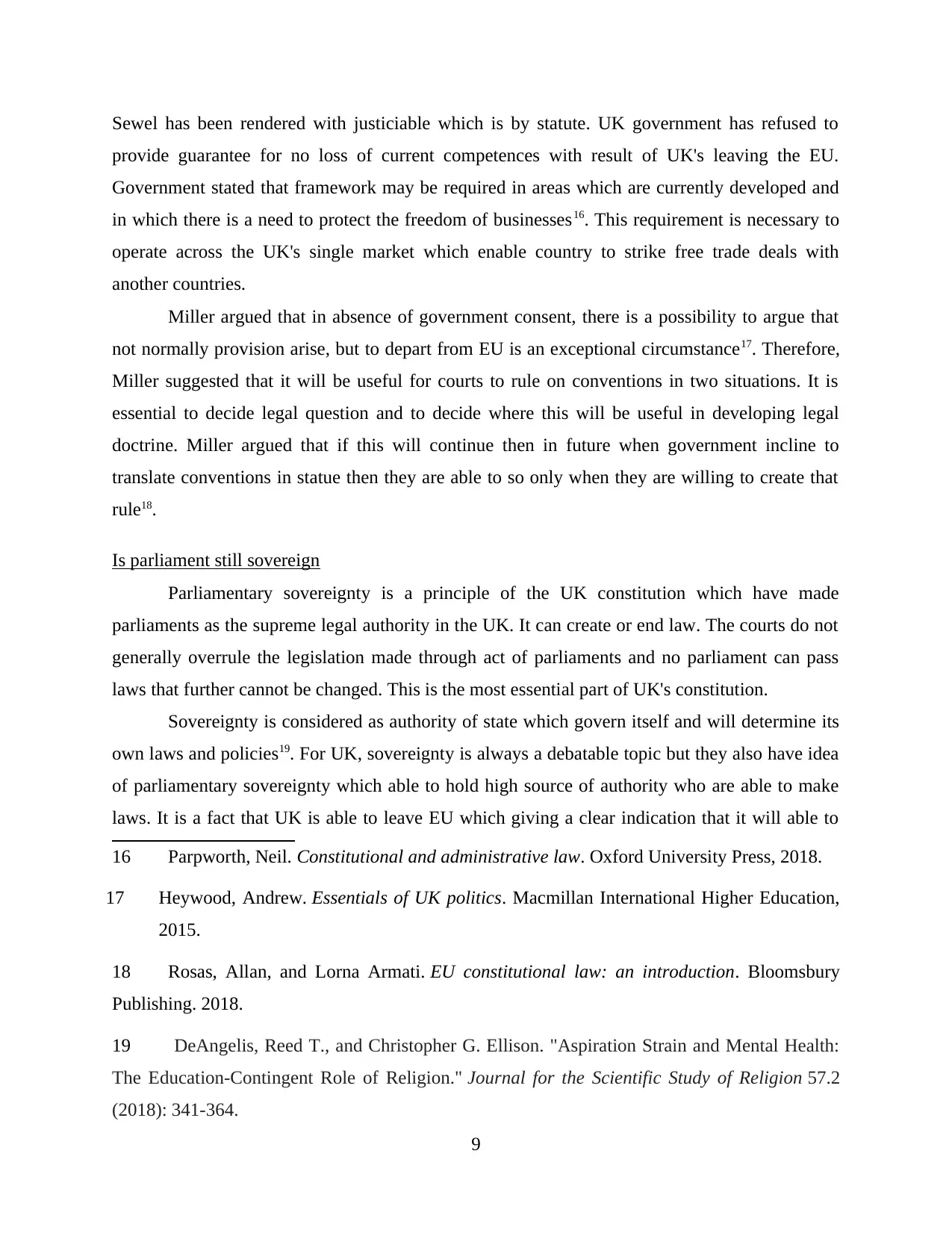
Sewel has been rendered with justiciable which is by statute. UK government has refused to
provide guarantee for no loss of current competences with result of UK's leaving the EU.
Government stated that framework may be required in areas which are currently developed and
in which there is a need to protect the freedom of businesses16. This requirement is necessary to
operate across the UK's single market which enable country to strike free trade deals with
another countries.
Miller argued that in absence of government consent, there is a possibility to argue that
not normally provision arise, but to depart from EU is an exceptional circumstance17. Therefore,
Miller suggested that it will be useful for courts to rule on conventions in two situations. It is
essential to decide legal question and to decide where this will be useful in developing legal
doctrine. Miller argued that if this will continue then in future when government incline to
translate conventions in statue then they are able to so only when they are willing to create that
rule18.
Is parliament still sovereign
Parliamentary sovereignty is a principle of the UK constitution which have made
parliaments as the supreme legal authority in the UK. It can create or end law. The courts do not
generally overrule the legislation made through act of parliaments and no parliament can pass
laws that further cannot be changed. This is the most essential part of UK's constitution.
Sovereignty is considered as authority of state which govern itself and will determine its
own laws and policies19. For UK, sovereignty is always a debatable topic but they also have idea
of parliamentary sovereignty which able to hold high source of authority who are able to make
laws. It is a fact that UK is able to leave EU which giving a clear indication that it will able to
16 Parpworth, Neil. Constitutional and administrative law. Oxford University Press, 2018.
17 Heywood, Andrew. Essentials of UK politics. Macmillan International Higher Education,
2015.
18 Rosas, Allan, and Lorna Armati. EU constitutional law: an introduction. Bloomsbury
Publishing. 2018.
19 DeAngelis, Reed T., and Christopher G. Ellison. "Aspiration Strain and Mental Health:
The Education‐Contingent Role of Religion." Journal for the Scientific Study of Religion 57.2
(2018): 341-364.
9
provide guarantee for no loss of current competences with result of UK's leaving the EU.
Government stated that framework may be required in areas which are currently developed and
in which there is a need to protect the freedom of businesses16. This requirement is necessary to
operate across the UK's single market which enable country to strike free trade deals with
another countries.
Miller argued that in absence of government consent, there is a possibility to argue that
not normally provision arise, but to depart from EU is an exceptional circumstance17. Therefore,
Miller suggested that it will be useful for courts to rule on conventions in two situations. It is
essential to decide legal question and to decide where this will be useful in developing legal
doctrine. Miller argued that if this will continue then in future when government incline to
translate conventions in statue then they are able to so only when they are willing to create that
rule18.
Is parliament still sovereign
Parliamentary sovereignty is a principle of the UK constitution which have made
parliaments as the supreme legal authority in the UK. It can create or end law. The courts do not
generally overrule the legislation made through act of parliaments and no parliament can pass
laws that further cannot be changed. This is the most essential part of UK's constitution.
Sovereignty is considered as authority of state which govern itself and will determine its
own laws and policies19. For UK, sovereignty is always a debatable topic but they also have idea
of parliamentary sovereignty which able to hold high source of authority who are able to make
laws. It is a fact that UK is able to leave EU which giving a clear indication that it will able to
16 Parpworth, Neil. Constitutional and administrative law. Oxford University Press, 2018.
17 Heywood, Andrew. Essentials of UK politics. Macmillan International Higher Education,
2015.
18 Rosas, Allan, and Lorna Armati. EU constitutional law: an introduction. Bloomsbury
Publishing. 2018.
19 DeAngelis, Reed T., and Christopher G. Ellison. "Aspiration Strain and Mental Health:
The Education‐Contingent Role of Religion." Journal for the Scientific Study of Religion 57.2
(2018): 341-364.
9
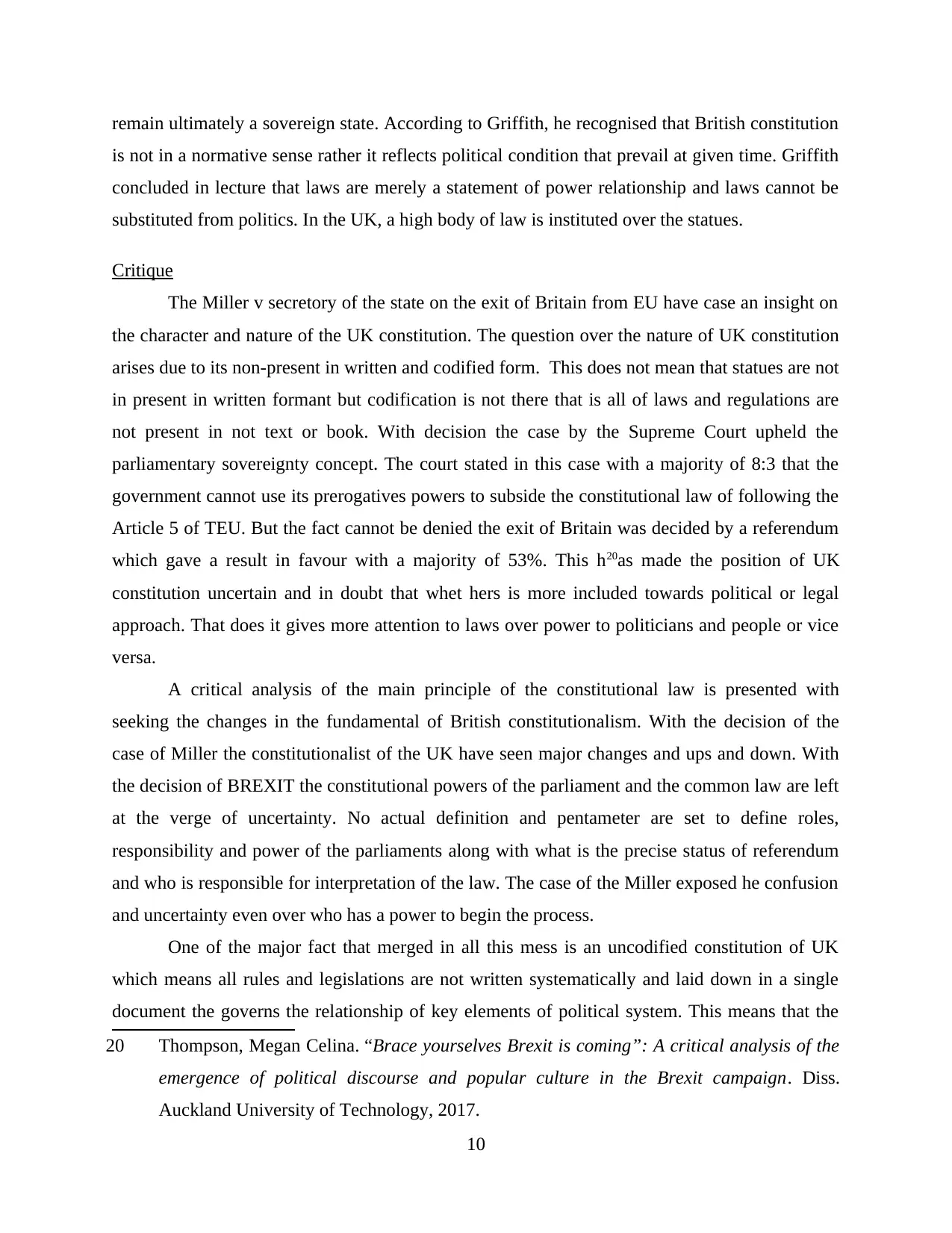
remain ultimately a sovereign state. According to Griffith, he recognised that British constitution
is not in a normative sense rather it reflects political condition that prevail at given time. Griffith
concluded in lecture that laws are merely a statement of power relationship and laws cannot be
substituted from politics. In the UK, a high body of law is instituted over the statues.
Critique
The Miller v secretory of the state on the exit of Britain from EU have case an insight on
the character and nature of the UK constitution. The question over the nature of UK constitution
arises due to its non-present in written and codified form. This does not mean that statues are not
in present in written formant but codification is not there that is all of laws and regulations are
not present in not text or book. With decision the case by the Supreme Court upheld the
parliamentary sovereignty concept. The court stated in this case with a majority of 8:3 that the
government cannot use its prerogatives powers to subside the constitutional law of following the
Article 5 of TEU. But the fact cannot be denied the exit of Britain was decided by a referendum
which gave a result in favour with a majority of 53%. This h20as made the position of UK
constitution uncertain and in doubt that whet hers is more included towards political or legal
approach. That does it gives more attention to laws over power to politicians and people or vice
versa.
A critical analysis of the main principle of the constitutional law is presented with
seeking the changes in the fundamental of British constitutionalism. With the decision of the
case of Miller the constitutionalist of the UK have seen major changes and ups and down. With
the decision of BREXIT the constitutional powers of the parliament and the common law are left
at the verge of uncertainty. No actual definition and pentameter are set to define roles,
responsibility and power of the parliaments along with what is the precise status of referendum
and who is responsible for interpretation of the law. The case of the Miller exposed he confusion
and uncertainty even over who has a power to begin the process.
One of the major fact that merged in all this mess is an uncodified constitution of UK
which means all rules and legislations are not written systematically and laid down in a single
document the governs the relationship of key elements of political system. This means that the
20 Thompson, Megan Celina. “Brace yourselves Brexit is coming”: A critical analysis of the
emergence of political discourse and popular culture in the Brexit campaign. Diss.
Auckland University of Technology, 2017.
10
is not in a normative sense rather it reflects political condition that prevail at given time. Griffith
concluded in lecture that laws are merely a statement of power relationship and laws cannot be
substituted from politics. In the UK, a high body of law is instituted over the statues.
Critique
The Miller v secretory of the state on the exit of Britain from EU have case an insight on
the character and nature of the UK constitution. The question over the nature of UK constitution
arises due to its non-present in written and codified form. This does not mean that statues are not
in present in written formant but codification is not there that is all of laws and regulations are
not present in not text or book. With decision the case by the Supreme Court upheld the
parliamentary sovereignty concept. The court stated in this case with a majority of 8:3 that the
government cannot use its prerogatives powers to subside the constitutional law of following the
Article 5 of TEU. But the fact cannot be denied the exit of Britain was decided by a referendum
which gave a result in favour with a majority of 53%. This h20as made the position of UK
constitution uncertain and in doubt that whet hers is more included towards political or legal
approach. That does it gives more attention to laws over power to politicians and people or vice
versa.
A critical analysis of the main principle of the constitutional law is presented with
seeking the changes in the fundamental of British constitutionalism. With the decision of the
case of Miller the constitutionalist of the UK have seen major changes and ups and down. With
the decision of BREXIT the constitutional powers of the parliament and the common law are left
at the verge of uncertainty. No actual definition and pentameter are set to define roles,
responsibility and power of the parliaments along with what is the precise status of referendum
and who is responsible for interpretation of the law. The case of the Miller exposed he confusion
and uncertainty even over who has a power to begin the process.
One of the major fact that merged in all this mess is an uncodified constitution of UK
which means all rules and legislations are not written systematically and laid down in a single
document the governs the relationship of key elements of political system. This means that the
20 Thompson, Megan Celina. “Brace yourselves Brexit is coming”: A critical analysis of the
emergence of political discourse and popular culture in the Brexit campaign. Diss.
Auckland University of Technology, 2017.
10
⊘ This is a preview!⊘
Do you want full access?
Subscribe today to unlock all pages.

Trusted by 1+ million students worldwide
1 out of 16
Related Documents
Your All-in-One AI-Powered Toolkit for Academic Success.
+13062052269
info@desklib.com
Available 24*7 on WhatsApp / Email
![[object Object]](/_next/static/media/star-bottom.7253800d.svg)
Unlock your academic potential
Copyright © 2020–2026 A2Z Services. All Rights Reserved. Developed and managed by ZUCOL.





